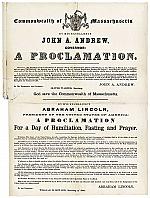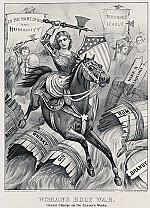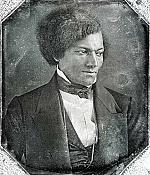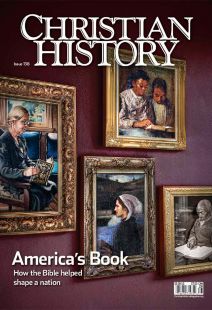Rebels with a cause

[Alexander Stirling Calder. Statue of Samuel Davies. Presbyterian Historical Society, 1896—Smallbones / [CC0] Wikimedia]
When the Continental Congress in 1776 asked Thomas Jefferson (1743–1826) and Benjamin Franklin (1706–1790) to design a seal for its would-be independent nation, they proposed images from Exodus 13 and 14—Israel’s miraculous journey through the Red Sea and the pillars of cloud and fire with which God protected his people. In so doing they touched on Revolutionary questions: Did the blessing of God rest on people in rebellion against their anointed monarch? Were they slaves toiling under the thumb of Pharaoh, awaiting God’s freedom? Triumphant Israelites finally entering the promised land? These images and more competed for attention as Bible believers eagerly turned to Scripture for a word from God for the times.
Mischievous taxes
The result could be eccentric—as in a sermon by Rhode Island Baptist John Allen (c. 1741–1785) on Micah 7:3. Allen somehow turned “a great man uttereth his mischievous desire” into a cry that Parliament’s tax on tea meant absolute tyranny. Copies of the sermon sold like hotcakes. Contemporary preachers also drew theological conclusions while commenting on contested issues, which did not always agree; John Witherspoon (1723–1794), president of the College of New Jersey, preached on Psalm 76:10 less than two months before becoming the only clergyman to sign the Declaration of Independence. Witherspoon strongly defended the struggle against Britain, but also stressed God’s providential ability to bring good out of human evil.
John Fletcher (1729–1785), one of John Wesley’s close colleagues, explained that Romans 13 gives magistrates power to “execute wrath upon him that doeth evil.” To Fletcher, colonists who complained about the “slavery” of Parliament while enslaving Africans were prime examples of evildoers. He concluded that Britain should fight against what he called “the tyranny of republican despotism.” But David Griffith, a Virginia Anglican who spoke from the same text, came to the opposite conclusion before fellow clergy in 1775. He drew on Old Testament examples to explain what Paul meant in Romans 13 by “the powers that be are ordained by God.” If, for example, the Lord approved Israel’s murmuring against Pharaoh’s tyranny, then, as just cause existed for the colonists’ complaints against Parliament, it was not wrong for them to rebel.
But the turn to Scripture with the most impact did not come from the pulpit; it came from Thomas Paine’s (1737–1809) explosive tract, Common Sense—much of it devoted to biblical interpretation. This call to arms, first published in early 1776 and reprinted at least 20 times that year, urged colonists uneasy about Parliament’s actions to abandon monarchical government altogether. Paine found proof in 1 Samuel 8, where God condemns Israel for choosing Saul as king.
Authors loyal to King George III rushed to print counterarguments: for instance, Deuteronomy 17:14–20 says God himself would give Israel a king, and at least five New Testament passages (such as 1 Peter 2:17) command something very different than rebellion. But Paine’s exceedingly evocative prose carried the day.
Dual implications
The Bible of the American republic reflected the history of four earlier periods. These periods shared an approach that would prove crucial in the Revolution: reading Scripture simultaneously as a book of eternal salvation and a book with implications affecting life in the world. The first era was the Reformation. At his famous appearance before the emperor at Worms in 1521, Martin Luther (1483–1546) boldly proclaimed, “my conscience is captive to the Word of God.” Although the phrase “sola scriptura” was not much used until later, the principle emerged alongside Protestantism. Protestants have never been able to agree exactly on what Scripture requires its readers to believe or to do. But they have agreed that the Bible deserves supreme honor as the book of salvation.
Four years after Luther’s famous declaration, William Tyndale (1494–1536) published his landmark New Testament in English. It provided much of the language eventually incorporated into the KJV. Tyndale began his preface to that New Testament by declaring that a Bible in the people’s language is a “light . . . to them that walk in darkness, where they cannot but stumble, and where to stumble is the danger of eternal damnation.” Because it sets forth the way of salvation, God’s revelation in the written Word should be honored above every other religious and secular authority.
After Tyndale’s translation, the most popular version in England and Scotland was the Geneva Bible (1557–1560), in use during the second era of biblical
interpretation guided by Puritan influences. This version was distinguished by its accessible price, memorable prose (much of it indebted to Tyndale), extensive marginal commentary, and pioneering division into individually numbered verse-paragraphs. This greatly facilitated use of Scripture but also encouraged an unfortunate tendency to chop biblical narratives into bits.
Most of the Geneva Bible’s marginal notes simply explained obscure material, but some encouraged readers to disobey their monarch when necessary. Christopher Goodman (1520–1603), one translator, underscored that revolutionary message with How Superior Powers Ought to be Obeyd of their Subjects; and Wherein they may lawfully by Gods Worde be disobeyed and resisted (1558). He and other ardent Protestants had fled to Europe when the Catholic Mary Tudor became queen in 1553 and began to silence England’s Protestants.
Transfixed by salvation
Many English settlers who colonized the New World agreed. The Bible opened for them the way of salvation; it also encouraged them to disobey rulers, parliaments, or traditions that in their minds violated the Scriptures. In Of Plimouth Plantation, William Bradford argued:
We desire to have the right worship of God and discipline of Christ established in the church, according to the simplicity of the gospel, without the mixture of men’s inventions; and to . . . be ruled by the laws of God’s Word, dispensed in those offices, and by those officers of Pastors, Teachers and Elders, etc. according to the Scriptures.
Other Puritan colonies were more explicit. When the Massachusetts Bay Colony drafted the “Body of Liberties” in 1641, instead of citing legal precedent or tradition, it gave biblical chapter and verse for many laws, backing each provision for capital punishment with a text from the Old Testament.
Although the colonies included several types of Protestants and a few Catholics, the Puritans were the most articulate, energetic, and ideologically influential settlers. They wanted above all to follow scriptural teaching. Just as important for their later influence, they regarded their own settlements as in some way analogous to ancient Israel. And they refused to let any top-down authority tell them what the Bible means.
Revivals that swept over much of colonial America in the 1730s and 1740s ushered in the third era, which added an evangelical component. Some of the Great Awakening’s opponents, like Charles Chauncy (1705–1787) of Boston, argued that the Bible condemned the disorder he perceived when preachers like George Whitefield (1714–1770) came to town. Whitefield’s great popularity and the preaching of lesser-known evangelists carried a different (and livelier) message.
For his part Whitefield always based his sermons on the Scriptures, calling them “the unerring rule of God.” His fame, however, rested on transfixing audiences by dramatizing the Bible’s story of salvation. Listeners gathered not at regular Sunday worship hours, but on work days in fields, public squares, and natural amphitheaters. His way of proclaiming the new birth spoke personally and powerfully to ordinary men and women, to the enslaved as well as to the free.
Two notable women in Newport, Rhode Island, Sarah Osborn (1714–1796) and Susanna Anthony (1726–1791), spread these evangelical influences. Their deep appropriation of the revivals’ scriptural truths made them effective Bible teachers, beloved spiritual mentors, and highly respected “mothers in Israel.”
Jonathan Edwards (1703–1758) became the Great Awakening’s most important theologian; his encyclopedic grasp of Scripture guided his preaching and philosophizing. The way other revivalists applied scriptural preaching to reach the lost would, however, exert a greater influence in shaping the religious future.
A new empire
Finally, the most immediate influence for the use of Scripture in the Revolutionary period was imperial. For decades the British Empire had used Scripture to justify a never-ending series of wars with Europe’s Catholic powers, many of them fought on American soil: Drummer’s War (1722–1725, against French-backed Native Americans); the War of Jenkins’ Ear (1739–1748, against the Spanish); King George’s War (1744–1748); and the French and Indian War (1754–1763). These conflicts brought anxiety, conflict, and sometimes brutal destruction into colonists’ daily lives. As Americans looked to Scripture for guidance, their earlier traditions supported a powerful merging of biblical loyalty with libertarian political philosophy.
In 1749 the governor of New Jersey asked pastor and renowned revivalist Gilbert Tennent (1703–1764) to preach a sermon celebrating British victory in King George’s War. Tennent took his text from Psalm 65:1 and included a lengthy tribute to English Protestant King William III who in 1688 had replaced Catholic James II. According to Tennent that decisive act paved the way for King George II, “the principal . . . Pillar of our Hopes, and Source of our Joys, as well as the Terror and Envy of our Enemies.”
Samuel Davies (1723–1761), learned revivalist, hymn-writer, and church organizer, preached several sermons to rouse Virginians near the start of the French and Indian War. He took his text for one from Jeremiah 48:10, exploiting the Puritans’ metaphorical identification of Britain with the children of Israel. On the one side stood “the Spirit of Patriotism . . . the inestimable Blessings of Liberty, British Liberty.” On the other were arrayed “the French, those eternal Enemies of Liberty . . . the horrid acts of Indian and popish torture . . . arbitrary Gallic power . . . Popish Slavery, Tyranny, and Massacre . . . the Chains of French Slavery.” The imperial wars fixed this absolute contrast in many minds. France, tyranny, poverty, vice, the pope, and disregard for Scripture presented a stark existential threat against Britain, liberty, prosperity, virtue, Protestantism, and obedience to the Bible.
But what if Britain later turned out to act like France? What if Parliament tyrannized the colonies? Beginning with the Stamp Tax (imposed to recoup expenses from the French and Indian War), that seemed to be exactly what was happening. Now the new Patriot cause was the “Pillar of our Hopes, and Source of our Joys, as well as the Terror and Envy of our Enemies.”
Protestant instincts to hold Scripture as an authority higher than kings, the Puritan tradition likening the new nation to Israel, evangelical disregard for inherited authorities, and a view of the world encouraged by imperial wars could have only one result. That result was the Bible of the American republic. CH
By Mark A. Noll
[Christian History originally published this article in Christian History Issue #138 in 2021]
Mark A. Noll is research professor of history at Regent College, professor emeritus of history at the University of Notre Dame, and author of In the Beginning Was the Word, The Civil War as a Theological Crisis, and America’s God: From Jonathan Edwards to Abraham Lincoln.Next articles
Preaching the holy war (Bible in America)
Both sides in the civil war appealed to the Bible
James H. MoorheadChristian History timeline: Haunted by the word
Americans have translated, interpreted, applied, and wrestled with the Bible from colonial times to the 21st century
the editors







